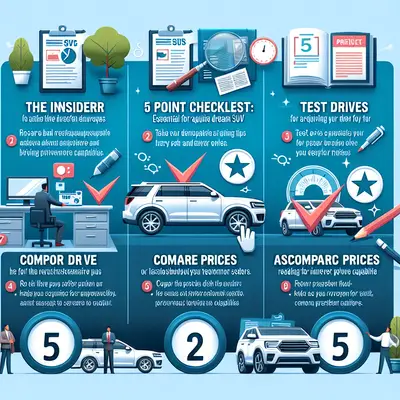It's no secret that the SUV market is a vast sea of choices, with each model boasting unique features and specifications. However, the challenge lies in navigating through this plethora of options to find the perfect SUV that fits your lifestyle and budget. This comprehensive guide provides you with a systematic approach to make a smart, informed decision.
1. Determine Your SUV Requirements
The first step to finding your perfect SUV is understanding your specific needs. Are you looking for a compact SUV for urban driving or a full-size SUV for family trips? Do you need advanced off-road capabilities or prefer fuel efficiency for long commutes? Clearly defining your requirements will help narrow down your options and focus on the SUVs that best meet your needs.
2. Research on the Latest SUV Models
Stay updated with the latest SUV models and their features. New models often come with advanced technology, better safety features, and improved fuel efficiency. However, don't be swayed by the 'newest' tag alone. Take time to compare different models and their specifications. Review sites and auto magazines provide valuable insights and comprehensive reviews.
3. Consider the Total Cost of Ownership
While the initial purchase price is significant, it's not the only cost associated with owning an SUV. Take into account the total cost of ownership, including fuel consumption, insurance, maintenance, and potential resale value. Some SUVs might have a lower purchase price but could be more expensive to maintain in the long run.
4. Test Drive Your Shortlisted SUVs
Nothing beats the experience of a test drive when it comes to selecting an SUV. It allows you to assess the vehicle's comfort, handling, performance, and practicality. Make sure to test drive on different road conditions to evaluate the SUV's capability. Pay attention to visibility, braking performance, and infotainment system usability during your test drive.
5. Negotiate and Inspect Before Purchase
Once you have made your choice, don’t rush into buying. Take time to negotiate the price with the dealer. If you are considering a used SUV, get it inspected by a professional mechanic to uncover any potential issues.
Conclusion
Purchasing an SUV is a significant investment, and it's crucial to make a well-informed decision. This guide provides a systematic approach to navigate the complex SUV market. Remember, the perfect SUV isn't just about the brand or price; it's about finding the vehicle that fits your lifestyle, meets your needs, and provides value for money.



